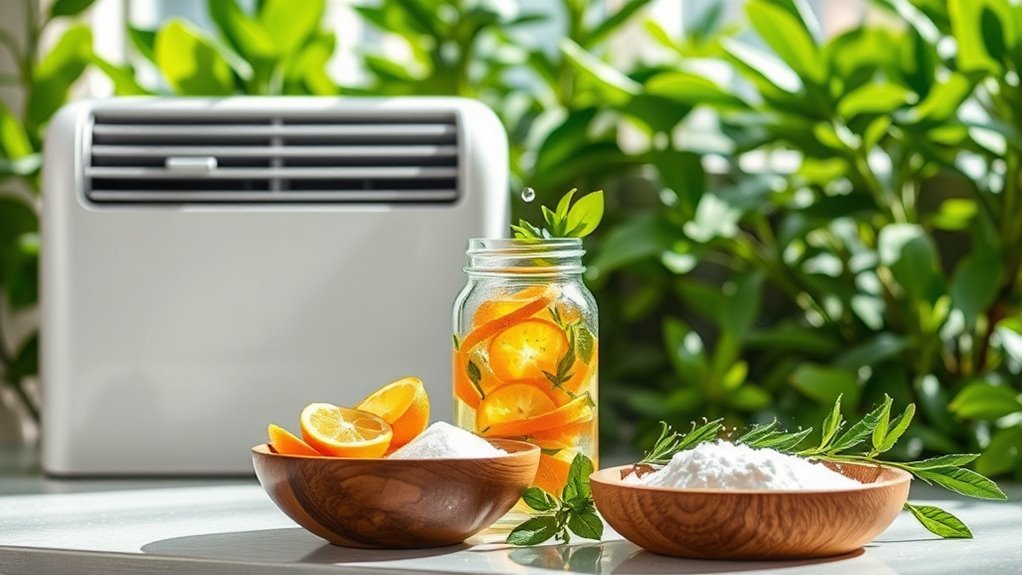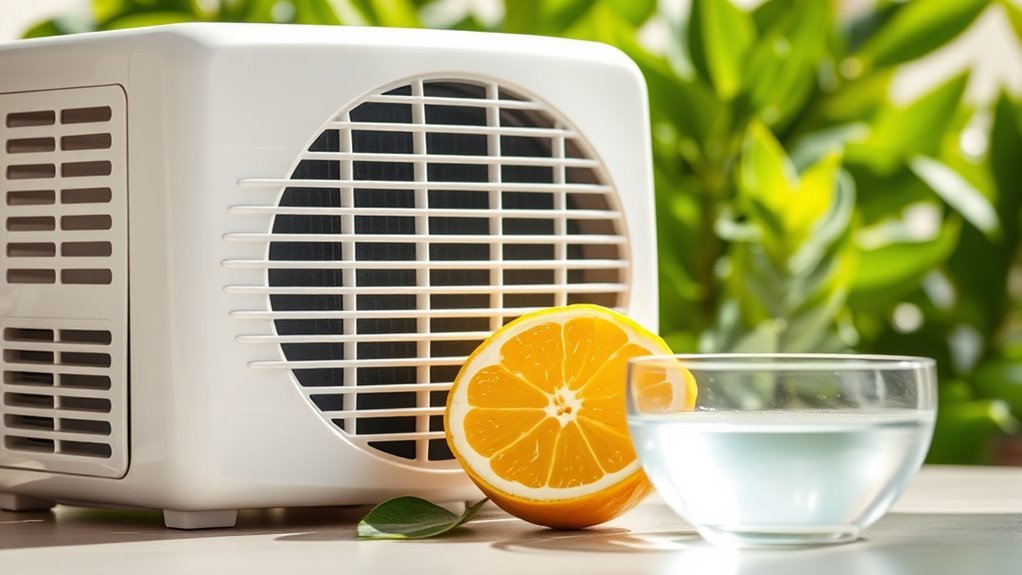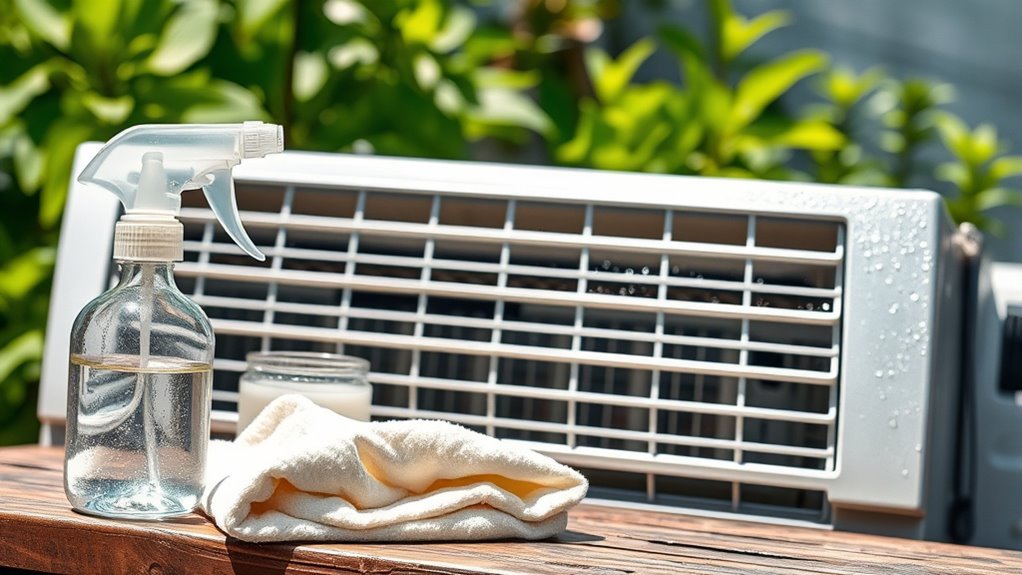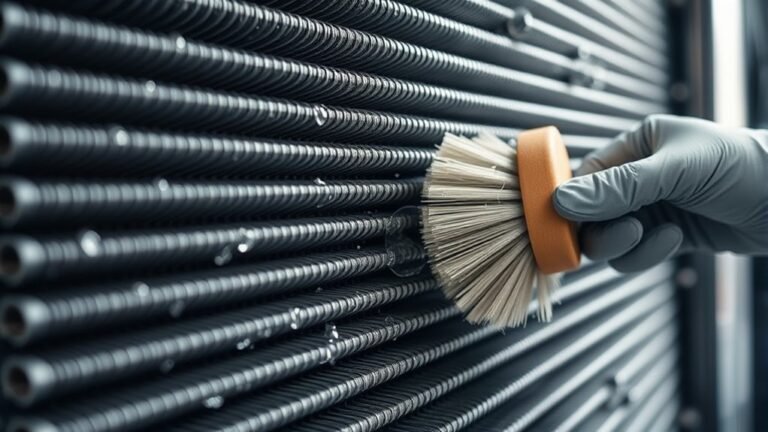Natural Cleaning Hacks for Your AC
You can boost your AC’s efficiency and indoor air quality by using natural cleaners like baking soda to scrub air filters, vinegar diluted to tackle mold and mildew, and lemon juice to neutralize odors. Always make certain the unit is powered off before cleaning. Regularly flush the drain pan with vinegar to prevent clogs and maintain airflow by clearing debris gently. Following these practical steps helps you maintain a healthier, eco-friendly system. Explore further tips to enhance maintenance and performance naturally.
Benefits of Using Natural Ingredients for AC Cleaning

Although conventional cleaning agents might seem effective, using natural ingredients for AC cleaning offers distinct advantages that enhance both performance and safety. By choosing eco friendly solutions, you minimize exposure to harmful chemicals that can degrade AC components over time, ensuring longer-lasting efficiency. Natural ingredients like vinegar or baking soda effectively eliminate mold and bacteria without leaving toxic residues, directly contributing to improved indoor air quality. This translates into significant health benefits, especially if you or your family suffer from allergies or respiratory issues. Additionally, these natural cleaners reduce environmental impact, supporting sustainable living practices. When you opt for natural cleaning, you’re not only protecting your AC unit but also preserving your freedom to breathe clean air and maintain a safer, more efficient cooling system. Using biodegradable cleaning products also helps reduce landfill waste and environmental harm.
How to Safely Turn Off and Prepare Your AC Unit
Before you begin cleaning your AC unit, you’ll need to turn it off safely to prevent damage and guarantee your safety. Start by switching off the thermostat to stop the system from running. Next, locate your circuit breaker panel and flip the breaker connected to the AC unit to the OFF position. This step is vital for safety precautions, eliminating the risk of electrical shock during cleaning. After power is disconnected, inspect the unit’s exterior for debris, and gently remove any loose dirt or leaves. Clear the surrounding area to make certain of unobstructed airflow once the unit is back in operation. Proper unit preparation sets the foundation for effective cleaning and prolongs your AC’s lifespan, giving you the freedom to maintain comfort without worry.
Cleaning the AC Air Filters With Baking Soda

One effective way to clean your AC air filters is by using baking soda, a natural deodorizer and mild abrasive. Start by removing the filters carefully from your unit. Mix a solution of warm water and a quarter cup of baking soda, exploiting baking soda benefits to break down grease and neutralize odors without harsh chemicals. Submerge the filters and gently scrub with a soft brush to dislodge trapped dust and debris. After thorough scrubbing, rinse under running water until clear. Allow the filters to air dry completely before reinstalling to prevent mold growth. This method guarantees efficient filter cleaning, maintaining airflow and system performance while keeping your indoor air fresh. Regular use of baking soda preserves filter integrity and supports your freedom from costly professional cleanings. Additionally, wiping down the surrounding seals and edges helps prevent mold and mildew buildup, enhancing overall system hygiene.
Using Vinegar to Remove Mold and Mildew
When you notice mold or mildew forming on your AC components, vinegar offers a powerful and natural cleaning solution. Its acetic acid concentration effectively breaks down mold colonies, making it ideal for mildew treatment without harsh chemicals. To apply, dilute white vinegar with water in a 1:1 ratio, then spray directly onto affected surfaces like coils or drip pans. Allow it to sit for at least an hour to guarantee thorough mold removal. Afterward, wipe clean with a damp cloth and verify the unit dries completely to prevent recurrence. Regular vinegar treatments contribute considerably to mold prevention by maintaining a hostile environment for fungal growth. This method provides a safe, eco-friendly approach that helps keep your AC system clean and your indoor air quality high. Using vinegar also reduces the risk of mold spores spreading to other areas inside your home.
Lemon Juice for Eliminating Odors in Your AC

You can effectively target odor-causing bacteria in your AC by applying lemon juice, which acts as a natural deodorizer. To do this, dilute lemon juice with water and spray it onto the air vents and filters, allowing it to sit before wiping clean. Using lemon juice not only neutralizes unpleasant smells but also avoids harsh chemicals, making it a safe and eco-friendly option.
Odor-Causing Bacteria Removal
Although odor-causing bacteria can build up inside your AC system over time, lemon juice offers a natural and effective solution to eliminate these smells. Its acidic properties inhibit bacteria growth, contributing to odor elimination without harsh chemicals. Using lemon juice helps maintain a fresher, healthier indoor environment while preserving your freedom from synthetic cleaners.
| Property | Effect on AC System | Benefit |
|---|---|---|
| Citric Acid | Breaks down bacterial films | Reduces bacteria growth |
| Natural Antimicrobial | Kills odor-causing bacteria | Prevents foul smells |
| Non-Toxic | Safe for indoor air quality | Enhances air freshness |
Lemon Juice Application Tips
Three key steps guarantee lemon juice is applied effectively for odor elimination in your AC system. First, dilute lemon juice with water at a 1:1 ratio to prevent corrosion on metal components. Second, use a spray bottle to evenly distribute the solution onto the air conditioning vents and coils, targeting areas prone to bacterial growth. Third, allow the lemon juice mixture to sit for 10–15 minutes before running the unit, ensuring sufficient contact time for odor neutralization. Avoid applying lemon juice directly onto electrical parts to maintain system integrity. By following these precise steps, you harness lemon juice’s natural acidic properties to break down odor-causing residues without harsh chemicals. This method keeps your air conditioning fresh while granting you the freedom from synthetic cleaners.
Benefits of Natural Deodorizers
Applying lemon juice properly sets the stage for understanding why it’s an effective natural deodorizer in your AC system. Its acidic properties neutralize unpleasant odors by breaking down odor-causing molecules, making it a preferred choice among eco friendly options. Additionally, lemon juice imparts fresh, natural fragrances without introducing harmful chemicals, preserving indoor air quality.
| Feature | Benefit | Reason |
|---|---|---|
| Acidic pH | Neutralizes odors | Breaks down odor-causing molecules |
| Natural fragrances | Leaves fresh scent | Releases volatile oils |
| Eco friendly options | Safe for environment | Biodegradable and non-toxic |
| Cost-effective | Saves money | Readily available household item |
| Easy application | User-friendly | Simple to apply in AC components |
Using lemon juice supports your desire for freedom—free from harsh chemicals and artificial scents.
DIY Natural Coil Cleaner With Essential Oils
When you want to maintain your AC’s efficiency without harsh chemicals, making a DIY natural coil cleaner with essential oils is an effective solution. Start by mixing distilled water, a mild liquid soap, and your preferred essential oil blends—such as eucalyptus and tea tree—for antimicrobial properties and natural fragrance alternatives. Use about 10-15 drops of essential oils per cup of solution. Apply the mixture with a spray bottle directly onto the coils, allowing it to sit for 10 minutes to break down dirt and grime. Then, gently rinse with water, ensuring no residue remains to avoid clogging. This approach keeps your AC clean, improves airflow, and refreshes the system’s scent, all while avoiding synthetic chemicals, giving you control over the cleaning agents you use. Make sure to use proper dilution to ensure safety and effectiveness when using essential oils in cleaning solutions.
How to Clean the Drain Pan and Prevent Clogs
You’ll want to start by draining any standing water from the pan and scrubbing it with a natural cleaner to remove buildup. Next, clear the drain line by flushing it with a vinegar solution to prevent clogs and guarantee proper flow. Regular maintenance like this keeps your AC running efficiently and avoids water damage.
Drain Pan Cleaning Steps
A clean drain pan is essential for preventing water damage and maintaining your AC’s efficiency. Start by turning off the unit and locating the drain pan beneath the evaporator coil. Carefully remove any standing water using a wet/dry vacuum or absorbent cloth. Next, apply a natural cleaning solution—like a vinegar and water mix—to break down mold, algae, and debris. Scrub the pan gently with a soft brush to avoid damage. Rinse thoroughly with clean water and dry the pan completely before reinstalling. Consistent drain pan maintenance not only prolongs the life of your AC but also prevents costly repairs. By following these precise steps, you guarantee your system runs smoothly, giving you the freedom to enjoy a comfortable, worry-free environment.
Clog Prevention Tips
Although cleaning the drain pan is essential, preventing clogs requires consistent attention to the drain line and surrounding components. Clog types vary from algae buildup to debris accumulation, each demanding targeted prevention methods. To maintain peak flow and avoid costly repairs, you should:
- Regularly flush the drain line with a vinegar solution to dissolve algae.
- Inspect and clear the drain pan for standing water or sediment.
- Install a drain line trap to block debris entry.
- Use a wet/dry vacuum to remove blockages from the drain outlet.
- Schedule periodic professional inspections for early detection.
Tips for Maintaining Your AC’s Exterior Naturally
When maintaining your AC’s exterior naturally, it’s important to focus on removing debris and preventing buildup without harsh chemicals. Begin by clearing leaves, dirt, and dust using a soft brush or a gentle water spray, guaranteeing you don’t damage the fins. Regularly inspect for rust or corrosion; treat these areas with a mixture of baking soda and water to neutralize oxidation, then rinse thoroughly. Apply a thin layer of natural oil, like neem or jojoba, on metal surfaces to provide natural protection against moisture and pests. Keep vegetation trimmed around the unit to guarantee airflow and reduce debris accumulation. By integrating these exterior maintenance steps, you’ll extend your AC’s lifespan while maintaining efficiency, all without compromising your freedom from chemical exposure. Using natural solutions for streak-free cleaning can also help maintain the AC’s exterior shine and prevent residue buildup.
Scheduling Regular Natural Cleaning for Optimal Performance
Since regular maintenance directly impacts your AC’s efficiency and longevity, scheduling natural cleaning at consistent intervals is crucial. You’ll want to establish a clear plan incorporating scheduling reminders and performance check ups to keep your system running freely without unnecessary energy waste.
Key scheduling tips include:
- Set bi-monthly natural cleaning dates based on usage and environment.
- Use digital reminders to guarantee timely maintenance.
- Incorporate seasonal performance check ups for filter and coil inspection.
- Record cleaning outcomes to track efficiency improvements.
- Adjust cleaning frequency according to dust levels and operational demand.
Additionally, controlling humidity levels helps prevent mold growth inside your AC system, maintaining cleaner air and reducing allergens.
Frequently Asked Questions
Can Natural Cleaning Harm My Ac’S Warranty?
You might think using a natural cleaner risks instantly voiding your AC warranty, but it’s not that dramatic. However, AC warranty implications depend on the manufacturer’s terms—some prohibit non-approved cleaning agents. Natural cleaner effectiveness varies, so using mild, non-corrosive solutions is key to avoid damage. To keep your freedom and protect your warranty, always check the manual or consult the manufacturer before applying any cleaner to guarantee safe maintenance.
How Often Should I Replace My AC Filters Entirely?
You should replace your AC filters entirely every 3 months for ideal filter maintenance, but this can vary based on usage and environment. During high pollen seasons or if you have pets, consider seasonal replacement every 1-2 months. Regularly inspecting your filters guarantees efficient airflow and prolongs your unit’s life. Staying proactive with filter changes keeps your system running smoothly, giving you the freedom to enjoy clean, cool air without hassle or costly repairs.
Are Natural Cleaners Safe for All AC Types and Brands?
You’ll want to verify natural cleaners compatibility with your specific AC model before use, as some ingredients might affect certain materials or components. While many natural cleaners are safe, always consult your AC maintenance tips guide or manufacturer’s instructions to avoid voiding warranties or causing damage. Being cautious guarantees your freedom to maintain your system effectively without costly repairs, keeping your unit efficient and long-lasting.
What Should I Do if Natural Cleaning Doesn’T Improve AC Performance?
If your AC performance is still sluggish, like a car stuck in mud, it’s time to explore cleaning alternatives beyond natural solutions. Check filters, coils, and ducts for deeper clogs or damage. Consider professional maintenance to diagnose mechanical issues or refrigerant problems. Regular servicing guarantees your AC runs freely and efficiently. Don’t let minor issues cage your comfort—act decisively to restore peak cooling power.
Can Pets Affect the Cleanliness of My AC Unit?
Yes, pets can affect the cleanliness of your AC unit. Pet dander often accumulates in filters and ducts, reducing air circulation efficiency. This buildup can strain your system, leading to higher energy use and potential malfunctions. To maintain peak performance, regularly clean or replace filters and consider using air purifiers to capture dander. Keeping your living space free from excess pet hair also helps preserve your AC’s cleanliness and air quality.






